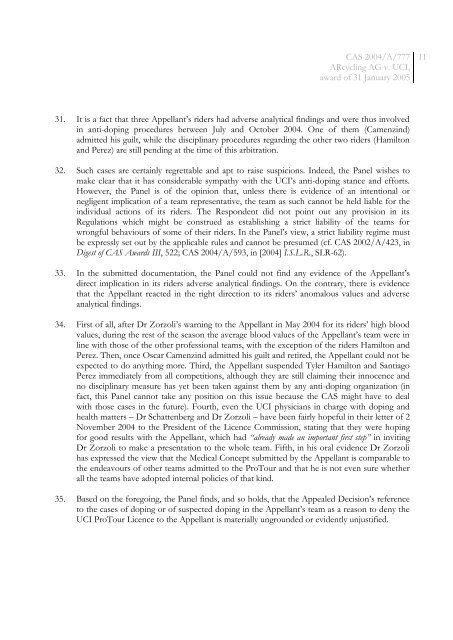TAS xxx - Tribunal Arbitral du Sport / TAS
TAS xxx - Tribunal Arbitral du Sport / TAS
TAS xxx - Tribunal Arbitral du Sport / TAS
- No tags were found...
You also want an ePaper? Increase the reach of your titles
YUMPU automatically turns print PDFs into web optimized ePapers that Google loves.
CAS 2004/A/777ARcycling AG v. UCI,award of 31 January 20051131. It is a fact that three Appellant’s riders had adverse analytical findings and were thus involvedin anti-doping proce<strong>du</strong>res between July and October 2004. One of them (Camenzind)admitted his guilt, while the disciplinary proce<strong>du</strong>res regarding the other two riders (Hamiltonand Perez) are still pending at the time of this arbitration.32. Such cases are certainly regrettable and apt to raise suspicions. Indeed, the Panel wishes tomake clear that it has considerable sympathy with the UCI’s anti-doping stance and efforts.However, the Panel is of the opinion that, unless there is evidence of an intentional ornegligent implication of a team representative, the team as such cannot be held liable for theindivi<strong>du</strong>al actions of its riders. The Respondent did not point out any provision in itsRegulations which might be construed as establishing a strict liability of the teams forwrongful behaviours of some of their riders. In the Panel’s view, a strict liability regime mustbe expressly set out by the applicable rules and cannot be presumed (cf. CAS 2002/A/423, inDigest of CAS Awards III, 522; CAS 2004/A/593, in [2004] I.S.L.R., SLR-62).33. In the submitted documentation, the Panel could not find any evidence of the Appellant’sdirect implication in its riders adverse analytical findings. On the contrary, there is evidencethat the Appellant reacted in the right direction to its riders’ anomalous values and adverseanalytical findings.34. First of all, after Dr Zorzoli’s warning to the Appellant in May 2004 for its riders’ high bloodvalues, <strong>du</strong>ring the rest of the season the average blood values of the Appellant’s team were inline with those of the other professional teams, with the exception of the riders Hamilton andPerez. Then, once Oscar Camenzind admitted his guilt and retired, the Appellant could not beexpected to do anything more. Third, the Appellant suspended Tyler Hamilton and SantiagoPerez immediately from all competitions, although they are still claiming their innocence andno disciplinary measure has yet been taken against them by any anti-doping organization (infact, this Panel cannot take any position on this issue because the CAS might have to dealwith those cases in the future). Fourth, even the UCI physicians in charge with doping andhealth matters – Dr Schattenberg and Dr Zorzoli – have been fairly hopeful in their letter of 2November 2004 to the President of the Licence Commission, stating that they were hopingfor good results with the Appellant, which had “already made an important first step” in invitingDr Zorzoli to make a presentation to the whole team. Fifth, in his oral evidence Dr Zorzolihas expressed the view that the Medical Concept submitted by the Appellant is comparable tothe endeavours of other teams admitted to the ProTour and that he is not even sure whetherall the teams have adopted internal policies of that kind.35. Based on the foregoing, the Panel finds, and so holds, that the Appealed Decision’s referenceto the cases of doping or of suspected doping in the Appellant’s team as a reason to deny theUCI ProTour Licence to the Appellant is materially ungrounded or evidently unjustified.
















